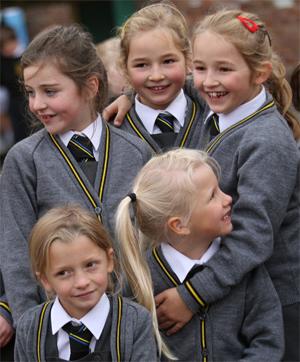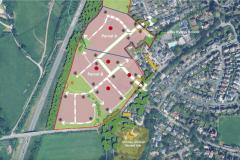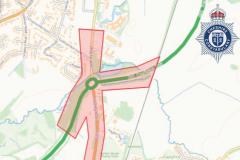
Following its inspection last month by the Independent Schools Inspectorate (ISI), The Ryleys School in Alderley Edge has been judged 'Outstanding' in every one of the twelve categories.
The Inspectors spent a total of five days in the school, observing lessons, chatting to the children, interviewing the staff, reviewing all documentation and analysing parental questionnaires. No stone was left unturned in a very thorough inspection, which gave a full and comprehensive insight into day-to-day life at The Ryleys, concluding that "Pupils are exceptionally happy with and justifiably proud of their school."
In the Early Years Foundation Stage (EYFS), which covers the Nursery and Reception, the school again achieved the highest accolade of 'Outstanding' in all four areas. The Inspectors commented that "Outcomes for children are outstanding" and that "they respond to school life with great enthusiasm and enjoyment."
Following the school's move from boys-only to co-education in 2009, the report recognises the "well-planned, smooth and highly successful transition" which has seen the number of girls in the school grow steadily, with numbers exceeding expectations.
The contribution of teaching within the school was highlighted as being "excellent and meets the school's aim to nurture pupils' gifts and talents and promote success" and that, consequently, "Across the school, achievement is excellent."
In addition, the report also highlighted pupils' exceptional success in national tests such as the Maths Challenge, and in the fields of Music, Art and Sport. "Extra-curricular provision is", it stated, "outstanding".
According to the Inspectors, "Pupils from the EYFS to Year 8 are extremely well educated within a happy, stimulating environment and gain entrance into senior schools of their choice."
Commenting on the Inspectors' findings, Headmaster Pat Barrett said "We are delighted with the outcome of the ISI visit. We welcome the honest appraisal of our school from an objective team of professionals, which has highlighted the commitment and enthusiasm of both the staff and pupils. We feel that the report accurately conveys the many aspects that make The Ryleys so special."








Comments
Here's what readers have had to say so far. Why not add your thoughts below.
As an example, basic understanding on the equivalence of fractions, percentages and decimals is lacking with those who I have tried to help, as is identifying new ways to inspire children to understand basic concepts; it's more "you are here to pass an exam" rather than learn. Discipline and routine I can really accept, especially as I would be poor in handling a class of 30 but, forming a closed mind I cannot.
Equally, there are parents, often forgoing holidays to pay fees, who so care for their children that they believe, as I did, sending a child to a private school, will 'motivate, inspire, stretch, etc.' a young person to achieve their potential. In life, they need more than that.
I say this for two reasons. I have witnessed better individual performance, both in terms of understanding and commitment, outside the fee-paying environment, accepting that private schools do provide other positive experiences. Secondly, having worked in industry for 25 years where audits, both regulatory and legal, are the norm I know too well that 'ticking boxes can tick nothing' in terms of delivering a passion for improvement.
I really hope this audit inspires Ryleys and other similar schools to ‘step-up ‘, not be complacent and get the lower 25 - 35% to the next level without the need for ‘After School’ remediation.
The findings of the ISI inspectors are not based, as he would suggest, upon ‘stats’ – and certainly not on anything so narrow as an assessment of potential A and A*s (we are a prep school, not a secondary school) - but upon the whole sweep of the school’s achievements, and its approach and ethos, which are anything but founded upon the principle of “you are here to pass an exam rather than learn”. Yes, our children will sit examinations for entry to the region’s top independent secondary schools and will achieve great success but, as everyone who knows the school also knows, The Ryleys’ achievements extend well beyond the academic and its commitment to a broad curriculum, designed to discover and encourage children’s various talents and abilities is total. It is this which is so clearly attested to by the findings of the inspectors.
Mr Barry is quite right to observe that there are children who struggle – The Ryleys does not select on the basis of academic ability – and an understanding of the equivalence of fractions, percentages and decimals can be difficult for some to master - but the school’s commitment to these children, as to all pupils, provided by a highly qualified and hard working team of Learning Support teachers and assistants and a dedicated staff, does a first class job in helping them to learn. If parents seek further support than can be provided in school, that is their prerogative, but does it not negate the fine work that is being done with what he somewhat alarmingly calls the ‘lower 25 -35%’.
Similarly, while I have no doubt that there are children outside the fee-paying sector who achieve excellent standards, and who receive excellent teaching in their schools, to say that they perform better, in terms of understanding and commitment, is simply spurious and not borne out by any evidence.
Inspections, as all teachers in both education sectors know, are not a tick-box exercise but a demanding and thorough investigation and appraisal of all aspects of school life and provision (and if anyone would question the validity or rigour of the ISI’s process then I should point out that our inspectors were themselves being inspected by an HMI from Ofsted as they worked!). We are very proud, and I think justifiably so, of what we have achieved but I can assure you that the last thing The Ryleys is, or any independent school can afford to be, is complacent.
In terms of personal motive and opportunism, an understandable interpretation perhaps, let me be clear. I am not making a swipe on the merits or otherwise of private education nor drumming-up ‘clients’; I attended a Catholic Grammar School myself so I value the commitment to high school standards and ethos. Equally, my core strengths are in helping pupils at GCSE level and above and yet parents are still asking me to help their ‘under 11’ children.
I recognise fully that this is a preparatory environment and so I am even more passionate that this phase is the most critical in the development of all pupils as does Pat Barrett. That said, my observations with Maths are different from would be deduced from the official report. If I’m wrong, I’m wrong but I don’t believe I am.